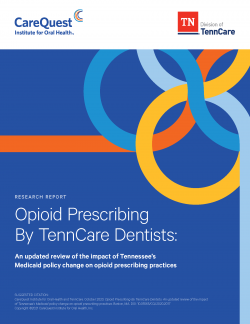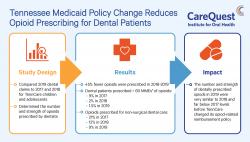A report from CareQuest Institute reveals that TennCare dentists — dentists providing care within Tennessee’s Medicaid program — wrote far fewer opioid prescriptions in 2019, indicating a successful policy change to reduce the number of opioids dispensed to dental patients. The corresponding decrease in the number of overdose deaths in Tennessee from 2017 to 2018 connected to prescription opioids suggests a link to the TennCare policy shift.
Specifically, the report shows that, while the number of TennCare patients ages 0 to 20 who received dental care in 2019 was similar to the number in 2017, nearly 11,000 fewer opioid prescriptions were issued in 2019, a difference of 45%.
Additional findings from the report include:
- A significant drop in the number of higher dose prescriptions issued. The percentage of TennCare dental patients receiving higher daily doses of opioids dropped from 9% in 2017 to just 1.5% in 2019.
- A notable reduction in the percent of opioids prescribed for non-surgical dental care, from 21% in 2017 to only 9% in 2019.
- Zero prescriptions for opioids containing codeine issued to patients age 0-11 in 2019, while the majority of opioids prescribed to this population in the first half of 2017 contained codeine. Opioids with codeine carry a greater risk of life-threatening complications in children.
This research builds off a 2019 report on opioid prescribing patterns by dental providers authorized by the TennCare dental network between 2017 and 2018.
Additional Resources:
- Pandemic Hasn’t Erased the Opioid Epidemic, an article from DentaQuest president and CEO Steve Pollock in CommonWealth Magazine.
- Opioid Overdose Deaths and Emergency Department Visits for Dental Conditions in Maryland, a poster presentation that examines the potential relationship between dental-related ED visits and opioid-related mortality.

